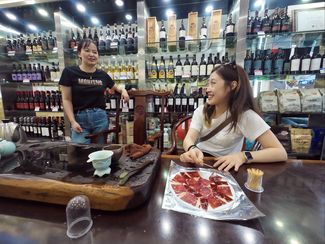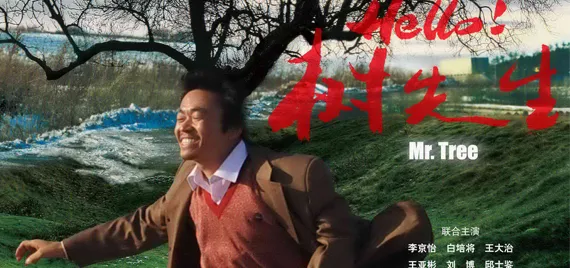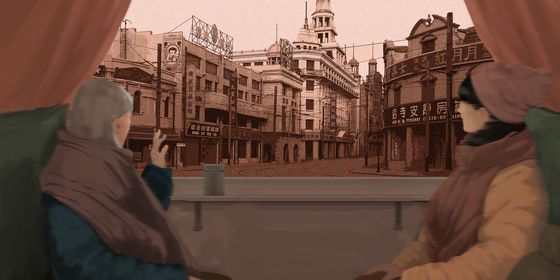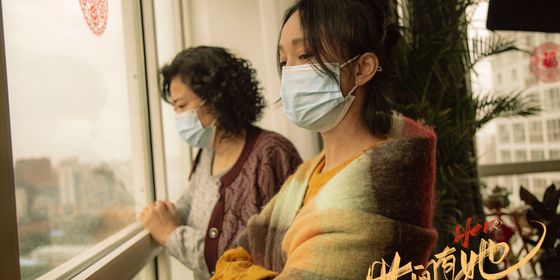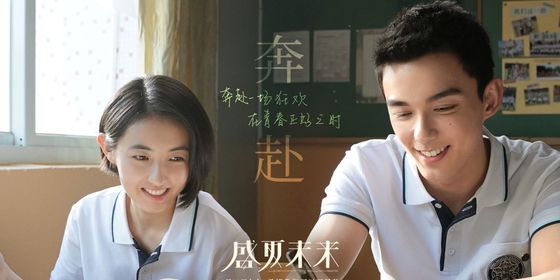A tale of drunkeness, love and horrific hallucinations
The movie has already garnered awards at the Shanghai International Film Festival for its willingness to push boundaries and the beauty of its composition, which comes courtesy of international cinema darling Jia Zhangke’s (贾樟柯) own production house.
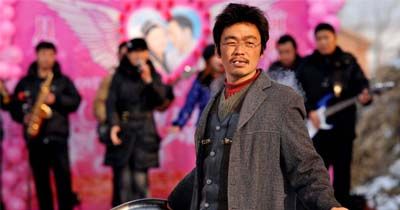
Mr. Tree, the babbling madman
Shu (树, tree), the eponymous protagonist, appears to be nothing more than the local village idiot, stumbling between bouts of timewasting and drunkeness with his crew of down-and-out friends, cab drivers and smalltime mining bosses.
He even seems unconcerned after a welding accident forces him to give up his job as a mechanic in a local factory, and continues to mooch around without any apparent purpose. Yet a chance encounter with deaf-mute beauty Zhang Xiaomei leaves him lovestruck. He begins to hallucinate and regurgitate horrific images from his past.
Flashbacks of Shu’s brother left hanging dead from a tree become an alternate reality; a frightful escape from the wandering and the intangible goals set by modern life. Shu’s affection for Xiaomei has clued his mind into the possibility that he can do something different. He quickly decides he will marry her and moves to the bright lights of Changchun city to make his proposal.
Shu begins by finding work in a school opened by old friend, Chen Yixin, and his wife. However, their domestic bliss is shattered when Chen’s wife discovers her husband’s affairs and kicks the pair of them out into the street:
“I slave to keep this home together, I’m so tired of struggling to keep this school afloat and you reward me by having all these affairs on the side! You’re just the same as your father! Bastard!”
(Wǒ máng lǐ máng wàidì cāochí zhège jiā, , wǒ lèi sǐ lèi huó dì dǎ lǐ zhège xuéxiào. Nǐ zài wàibian gěi wǒ gōu sān dā sì de, nǐ, , nǐ gēn nǐ diē yīgè déxíng. Wángbā dàn! )
我忙里忙外地操持这个家, ,我累死累活地打理这个学校。
你在外边给我勾三搭四的,你, ,你跟你爹一个德行. ,王八蛋!

On his first date with the love of his life, things go...less than well for Tree
Shu remains fixated on Xiaomei and hits upon the perfect method to communicate despite her disability: sending her romantic SMS messages:
“Do you know? Since the first time I saw you, the best thing in this world is to look into your eyes. I wouldn’t trade that for being a village head!”
Nǐ zhīdào ma? Dāng wǒmen xiāng shì de yīkè, Jiùshì zhè shìjiè zuìměi de shùnjiān, Jiùsuàn gěi wǒ gè cūn zhǎng wǒ yě bùdāng!
你知道吗?当我们相视的一刻,就是这世界最美的瞬间,
就算给我个村长我也不当!
Shu even dabbles with writing romantic poetry, adding greater depth to his character while at the same time suggesting he is not as stupid as he sometimes appears:
“I pine for you like cigarettes, remember you like wine / You’re just like cigarettes and wine / A cigarette that’s always in my hand / Wine that never leaves my mouth.”
Xiāngsī shì yān, xiāng yì shì jiù jiǔ, Nǐ jiù xiàng nà yān jiǔ, Gǎo de wǒ yān bùlí shǒu, Jiǔ bùlí kǒu!
相思是烟,相忆是就酒,你就像那烟酒,搞得我烟不离手,酒不离口!
But the girl doesn’t fall for Shu’s romantic approach, and chooses instead to focus on the practicalities :
“Quit smoking and drinking, then we can be friends.”
Jièyān jiè jiǔ,, zài zuò péngyǒu.
戒烟戒酒,,再做朋友。
Even when the couple communicate in person through short messages written on paper, the girl remains resolute and determined in the face of Shu’s imploring marriage proposals:
Shu: “Talk to your parents and then let’s marry.”
Gēn nǐ diē mā shuō, zán jiéhūn ba.
跟你爹妈说,咱结婚吧。
Xiaomei: “My marriage is my business and has nothing to do with my parents!
Jiéhūn shì wǒ de shì, wèi shà yào xiān gēn wǒ bà mā tán!
结婚是我的事,为啥要先跟我爸妈谈!
Shu: “Find out if they will impose any conditions.”
Nǐ kàn tāmen yǒu shé me tiáojiàn ma.
你看他们有什么条件嘛。
Xiaomei: “Letting others decide your destiny for you, isn’t that sad?”
Ràng biérén juédìng nǐ dé de mìngyùn, nà bù kěbēi ma?
让别人决定你得的命运,那不可悲吗?
Shu: “Let me take care of your destiny!”
Jiù bǎ nǐ de mìngyùn jiāo gěi wǒ ba!
就把你的命运交给我吧!
Xiaomei: “You fool!”
Shǎ yàngr!
傻样二儿!
The new couple move back to their hometown to arrange the wedding. As they embark on the road to a new life, Beijing rock band Second Hand Rose’s (Èrshǒu méiguī, 二手玫瑰) generational anthem “The train is leaving soon” (Huǒchē kuài kāi 《火车快开》) plays over the car stereo as they join hands.
“Our lives are departing. Where are they going? They are directed to happiness. Our love is departing. Where is it going? It’s directed to eternity.…”
Wǒmen de shēnghuó jiù yào kāi, Wǎng xìngfú lǐ kāi. Wǒmen de àiqíng jiù yào kāi, Wǎng nǎ’er kāi? Wǎng yǒnghéng lǐ kāi.
我们的生活就要开,往幸福里开。我们的爱情就要开,往哪儿开?往永恒里开。
On the eve of the wedding, Shu’s dead older brother, an ecstatic hippy, appears in a vision that renders Shu incapable of discerning dream from reality. While he just about manages to consumate his marriage, Shu never fully recovers his senses and is largely disregarded as a babbling madman. However, that all changes when he is struck by a premonition that eventually turns out to be true.
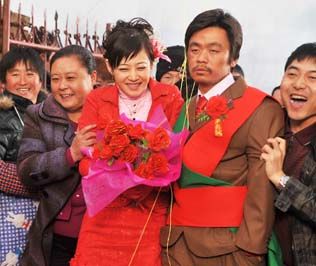
Mr. Tree is happy to marry Xiaomei, though you wouldn't know it from looking at him
This apparent ability to predict the future entices even the local mining bosses to turn to Shu for advice on their business. Shu indulge’s them with a little cheek.
Shu: “Take a look at the old mine there. It has polluted so much of our land. Plough money into scientific research, the coal residues can be used to manufacture an atom bomb. Our country has Four Great Inventions to its name, let’s add a fifth at a stroke!”
Nǐ kàn nà biān fèiqì de méi gānshí, Tài wūrǎn zánmen dìqiúle, yīnggāi chōuchū bùfèn zījīn gǎo gǎo kēyán, Zánmen jiù yòng zhèxiē méi gānshí zào chū yuánzǐdàn,. Zánmen guójiā bùshì yǒu sì dà fāmíng ma, yīxià zi jiù biàn chéng wǔdà fāmíngliǎo.
你看那边废弃的煤矸石,太污染咱们地球了, 应该抽出部分资金搞搞科研,咱们就用这些煤矸石造出原子弹。咱们国家不是有四大发明吗, 一下子就变成五大发明了。
Director Jia: What a wonderful suggestion! I will certainly give it some serious thought when we return.
Nǐ zhège jiànyì fēicháng hǎo a, huíqù wǒmen yīdìng hǎohǎo yánjiū yánjiū.
你这个建议非常好啊,回去我们一定好好研究研究。
Shu: As I see it there are abundant resources on the moon, we must go to the moon as a priority and steal a march on our capitalist rivals.
Jù wǒ guānchá, yuèqiú shàng yǒu zánmen yòng bù wán de zīyuán, zánmen yào qiǎngxiān dēnglù yuèqiú, yīdìng chāoguò nàxiē zīběn zhǔyì guójiā.
据我观察,月球上有咱们用不完的资源,咱们要抢先登陆月球,一定超过那些资本主义国家。
Director Jia: We have a long way to go, I hope we can join hands and work together.
Rèn zhòng ér dào yuǎn ne, xīwàng wǒmen xié qǐ nǔlì.
任重而道远呐,希望我们携起努力。
At the movie’s finale, Xiaomei is reunited with Shu and tells him that she is pregnant. Moved, Shu can only say:
“Let’s move into the new flat, we can have the baby there.”
Zán bān dào xīn fángzi lǐ ba, bǎ háizi yě shēng dào xīn fángzi lǐ.
咱搬到新房子里吧,把孩子也生到新房子里。
Suddenly, Xiaomei talks for the first time in the movie:
“Let’s go, We go!”
Zǒu ba, zán zǒu.
走吧 ,咱走。
She can finally speak, but is it real or just another vision? Does it really matter? Shu appears happy as he walks through a field toward the new city, ready to embrace his future.

